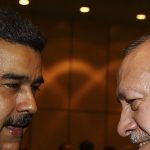By Cengiz Aktar
“Last May, by boycotting the Venezuelan elections, the main opposition was able to keep participation rates below 46 percent. Although Nicolás Maduro (a buddy of Turkish president Recep Tayyip Erdoğan) was able to win the elections through force and fraud, following the elections, the majority in his country, 13 South American nations, and the West declared him illegitimate. Let’s see how much longer he will last.” I wrote this only 15 days ago, but the Latin American hero of Turkey’s prehistoric socialists was not able to hold out for very long.
Maduro took an oath of office on Jan. 10 and began his second six-year term. When the main opposition boycotted the elections held on May 20 participation rates remained at 46.07 percent, and Maduro won 67.8 percent of the vote. The 46.07 percent rate was the lowest electoral participation in Venezuela’s history since 1958.
On May 20, Maduro and his supporters called on Venezuelans to vote, the ruling United Socialist Party offered an array of bribes to force people into casting their ballots, the polling stations that were supposed to close at six p.m. stayed open into the late hours of the night, and every manner of egregious act was committed, but most still did not turn out to vote.
Following the polls, the United States, the European Union, Canada, and 13 South American countries declared the election to be illegitimate, citing the unfair campaign, fraud and low participation rates. Many countries, foremost among them the United States, now recognise the leadership of National Assembly President Juan Guaido, who declared himself interim president. Germany, Britain, France, and Spain presented Maduro with an ultimatum: unless he announces new elections within eight days, they would recognise Guaido as president. On Thursday European Parliament recognized Guaido as president of the country. Venezuela is in a crisis of legitimacy.
The fiasco caused by the policies of Maduro and his late patron and predecessor as president, Hugo Chavez, is noteworthy. In the beginning, Chavez adopted policies identical to his predecessors, building social policy funded by oil revenues. However his policies reached many more Venezuelans than before, and this allowed him to win election after election. By targeting the most fragile segments of the population, who had not received their share of the country’s wealth until that point, his popularity soared. No protest was able to undermine public support and Chavez won more than 12 consecutive elections.

Chavez recalibrated the country’s institutions and made countless constitutional and legal changes to secure his regime. The separation of powers was dismantled. The military, which had the potential to object to these policies, was bought off with wage rises and special allowances. Many companies were nationalised. The media and the opposition were silenced. He established his own paramilitary force.
As oil prices fell, the revenues the government had been handing out so profusely disappeared. National debt, foreign exchange regimes, ceiling prices, falling oil production, U.S. sanctions (except oil), and diplomatic isolation brought about the collapse of a Venezuela that at the turn of the century had been the wealthiest country in South America.
Today, there is poverty amidst plenty. Some people are starving to death. By the end of 2018, the number people who sought political or economic asylum abroad had reached 3 million – 10 percent of the population. As conditions worsen in this unfortunate country, cruelty is increasing, and people of different political backgrounds are rejecting this terrible administration for many reasons, including their unmet basic survival needs. Labelling these people “fascists”, “counterinsurgents”, or “American lackeys” can only be the result of a sickly state of mind, brought about from a combination of ignorance, arrogance, and bigotry.
Interestingly, as evidenced by the Maduro-Erdoğan camaraderie, there are significant similarities between the two countries. They are both consummate fascist regimes at the mercy of one-man authority that become increasingly cruel as the going gets rough, who enjoy a certain support base in spite of everything they do, who place great value on the legitimacy of elections, and who are terrified of relinquishing power. An intertwined fate for the two men is only natural.
With an eye to Maduro’s crisis of legitimacy, let us reiterate: As many frequently argue, boycotting Erdoğan’s elections does not amount to gifting the elections to the sultan on a golden platter. It is wrong to argue Erdoğan would not care about a boycott, which has not been attempted until today with the exception of 2010, and even then was limited to the Kurdish Peace and Democracy Party. A boycotted election with low participation rates, especially if those rates stay below 50 percent, would pull out from under Erdoğan’s feet the guise of legitimacy that he uses to justify his actions. A boycotted local election in Turkey on March 31 would effectively expose the ongoing crisis of legitimacy.
People living in Turkey need to unlearn what they have been taught about the meaning and function of elections. It has been written countless times before the elections, and was repeated countless times after: The current regime will not end through elections
Those who argue otherwise are either sly political peddlers vying for interest, or opinion leaders living with pipe dreams. The latter, perhaps unwittingly, advocate for the continuation of this system under the pretence of hope and optimism. Their behaviour is highly irresponsible.
The dismal state of the economy is obvious. In foreign relations, the government is being cornered at every turn. Judgment Day is approaching in the Syrian city of Idlib, packed with radical jihadists. Clashes with Western oil interests are a risk in the eastern Mediterranean. Turkey’s only policy in the Aegean is doling out threats. As far as the West is concerned, policy towards Turkey was reduced to a matter of crisis management and damage control. The Russia basket, in which all of Turkey’s eggs have been placed, is riddled with holes
Beginning April 1, Turkey will enter a four-year period without elections. This is when fascism will be consolidated. Faced with internal and external fiascos, the regime will become increasingly hardened. In some respects, March 31 is the last stop before a long desert. Keeping electoral participation rates below 50 percent through boycott may not take down the regime, but it will cause it to seriously falter. Keep this in mind.
Source: Ahval News



